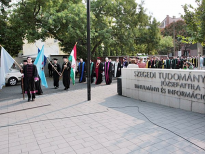University of Szeged, Konfucius Institute - Ahol tudás és szándék találkozik
 HISTORY
HISTORY
History
Confucius Institutes are non-profit educational institutes of the People’s Republic of China. Their primary objective is to spread Chinese language and culture and reviving cultural relationships. The Confucius Institute – unlike particular countries’ own cultural institutions – is supported by the Chinese government and always operates as part of a local educational institution.
The institutes are named after the famous Chinese philosopher, Confucius (551-479 B.C.), whose name and teachings influence Chinese way of thinking and attitude culture even today.
The parent institution coordinating the work of Confucius Institutes is Confucius Institute Headquarters (Hanban) operating under the supervision of the Chinese Ministry of Education in Beijing.
The first, pilot Confucius Institute was established in Taskent, Uzbekistan in June 2004 and then the first official Confucius Institute was opened in September 2004 in Seoul, South Korea. By 2010 altogether 322 Confucius Institutes and 369 Confucius Classrooms (branch institutes) had been established in a total of 96 different countries. Similarly, by 2010, more than one hundred Confucius Institutes had started their operations in 31 European countries. Currently there are approximately 200 educational institutions, such as famous universities, are waiting for the opportunity to establish their own institute. According to the estimation of the Chinese Ministry of Education, by 2010 one-hundred million people were studying Chinese as a foreign language all over the world. Confucius Institute Headquarters (Hanban) has set the objective of establishing 1 million institutes by 2020.
The Confucius Institute at the University of Szeged was officially opened in the autumn of 2012 as a result of the cooperation of the University of Szeged and the Shanghai International Studies University with the support of Hanban. For those interested in learning Chinese as a foreign language the Institute offers language classes taught by professional Chinese language teachers. Language classes are held both at the classrooms of the Confucius Institute and of the different faculty buildings of the university. Besides language teaching, the Institute emphasizes the importance of opening up Chinese culture to as many people as possible: the Institute organizes a great variety of exciting programs for everyone interested.
The operation of the institution is assisted by an Advisory Board of seven members appointed by the Hungarian and Chinese partners:
- dr. István Ujhelyi, Chairman (Representative of the European Parliament)
- Dr. Cao Deming, Vice-chairman (President of Shanghai International Studies University)
- Prof. dr. Krisztina Karsai (Vice-Rector for Education of the University of Szeged)
- Zhang Xuemei (Secretary General of Shanghai International Studies University and Chinese International Centre of Education)
- Mohr Richárd (Director of Confucius Institute at the University of Szeged)
- Zhang Lin (Chinese Director of Confucius Institute at the University of Szeged)




